Student Notebook
Student Events at the 23rd Annual APS Convention
APS Student Caucus Convention Kickoff and Student Social
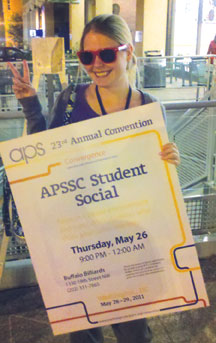
Nearly 300 APS Student Affiliates attended the APSSC Student Social. Darcey Sims holds the sign outside Buffalo Billiards.
The APSSC Convention Kickoff and Student Social, held at Buffalo Billiards, drew record crowds. Nearly 300 students enjoyed drinks and hors d’oeuvres while playing pool and chatting. Incoming and outgoing members of the APSSC Board had the opportunity to meet with members and discuss their interests. As in years past, APSSC distributed stickers to help identify an individual’s research areas. Overall, the social was a great success, and the Board thanks all who attended!
The Naked Truth I: Getting Into Graduate School
Nathaniel S. Ring, Chair
The first of three panels in the Naked Truth series provided an excellent opportunity for prospective graduate students to get an insider’s view of the application process from three young scholars. In a wide-ranging discussion, Jessica Badger, George Washington University; Goal Saedi, University of Notre Dame; and Matthew Wood, Carnegie Melon University, offered perspectives on deciding between terminal master’s and PhD programs, securing funding for your graduate education, finding programs and advisors that fit your career goals, and more.
The Naked Truth II: Surviving Graduate School
Jessica Wong, Chair
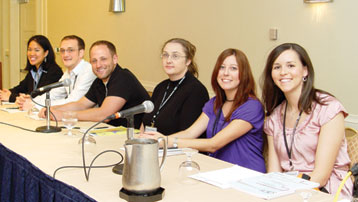
Jessica Wong, Kuba Glazek, Evan M. Kleiman, Chrysalis Wright, Jenni Schelble and Caitlin Kennedy at the APSSC event, The Naked Truth Part II: Surviving Graduate School.
Classes, research, and teaching, oh my! Kuba Glazek, Temple University; Caitlin Kennedy, George Washington University; Evan Kleiman, George Mason University; Jenni Schelble, University of Florida; and Chrysalis Wright, St. Cloud State University, provided advice and answered questions about the challenges of graduate school. They discussed transitioning from college to graduate school, obtaining funding, and maintaining a healthy work-life balance.
The Naked Truth III: Navigating the Academic Job Market in Tough Economic Times
Jeremy Ashton Houska, Chair
In the third installment of the Naked Truth series, “Life After the PhD,” faculty panelists offered their sage advice and cautions for students considering academic jobs. A lively audience posed questions about the application process, phone interviews, and preparation for on-campus interviews. David E. Copeland, University of Nevada, Las Vegas; Robert Ervin Cramer, California State University, San Bernardino; Amy S. Pollick, Gallaudet University; and Tony Scinta, Nevada State College, shared their experiences as job candidates, members of search committees, and department chairs.
The Science of Clinical Psychology in the 21st Century: Where Do We Go From Here?
Peter M. Vernig, Chair
This panel focused on how the translation of basic and applied research into clinical practice will shape the future of the field. The audience and chair posed questions that led to a spirited discussion of such topics as diagnostic systems, evidence-based-practice implementation, and the training of future psychologists. Panelists included Carlo C. DiClemente, University of Maryland; Rise B. Goldstein, National Institute on Alcohol Abuse and Alcoholism; Richard G. Heimberg, Temple University; Michael J. Kozak, National Institute of Mental Health; Bonnie Spring, Northwestern University; and Antonette M. Zeiss, Department of Veterans Affairs.
How to Get Published: Guidance From Journal Editors
Mandi White-Ajmani, Chair
This year’s panel was a smashing success. Renowned researchers and journal editors Tom Widiger, Annual Review of Clinical Psychology and the Journal of Personality Disorders; Ann Kring, Journal of Abnormal Psychology; John Jonides, Psychological Science; and Nancy Eisenberg, Child Development Perspectives, shared their expertise with almost 200 attendees, answering questions and sharing tips about writing a good manuscript, navigating the review process, and understanding publishing etiquette.
Champions of Psychological Science
Jeremy Ashton Houska, Chair
The APSSC was honored to present the annual Champions of Psychological Science event, which provided students the opportunity to join roundtable conversations with some of the most well-known and revered psychological scientists. This year, the APSSC is especially grateful to Alice H. Eagly, Northwestern University; Arthur M. Glenberg, Arizona State University; Philip N. Johnson-Laird, Princeton University; Gary P. Latham, University of Toronto; and Varda Shoham, University of Arizona, for sharing their knowledge and wisdom with future psychological scientists.
APSSC Campus Representatives Meeting
K. Andrew DeSoto, Chair
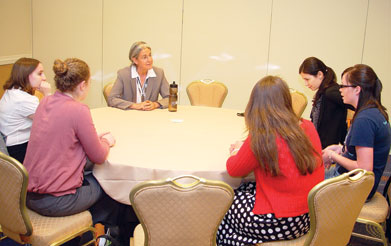
Varda Shoham talks with students at the Champions of Psychological Science roundtable. This annual event offers students an opportunity to meet leading researchers.
College sophomores and three-time veteran Campus Representatives alike sat down at a boardroom table to discuss the Campus Representative program with the incoming and outgoing APSSC Membership and Volunteer Officers. The group noted the importance of Spring Rally Week and brainstormed different ways to make promotion of APS and its initiatives as frictionless as possible. A focus for next year will be to increase the scope of the program, which already includes over 100 students in countries around the world. If your college or university doesn’t have a representative, now is a perfect time to get involved!
RISE Research Award Symposium
Paul J. Schroeder, Chair
The RISE Research Award Symposium at the APS Annual Convention showcases the work of the current RISE Research Award winners. Now in its 13th year, the RISE Research Award is given to graduate students whose research examines issues pertinent to socially and economically underserved populations. This year’s award winners/presenters were Sabrica Barnett, CUNY; Bryan Jensen, Brigham Young University; Lillian Polanco, CUNY, Hunter College and Allison Skinner, University of Southern Indiana.
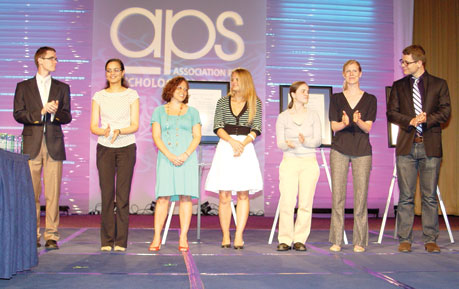
Student award winners were highlighted during the Opening Ceremony on Thursday night. L to R: Bryan Jensen, Lillian Polanco, Sabrica Barnett, Susanne Schweizer, Larisa Heiphetz, Allison Skinner, and David Miller.
Student Research Award Symposium
Jessica Wong, Chair
The winners of the 2011 Student Research Award competition, who were selected by peer review from a large applicant pool, presented their projects at the award symposium. This year’s winners/presenters were Larisa Heiphetz, Harvard University; David Miller, University of California, Berkeley; Hans Schroder, Michigan State University; and Susanne Schweizer, Medical Research Council, United Kingdom. Their research covers a range of fields within psychological science, drawing from cognition, development, neuroscience, and social/personality psychology.
Transitions: Students in Psychological Science
Jessica T. Wong, APSSC President
University of Chicago
The field of psychological science is constantly in a state of change. Many legendary psychological scientists have provided the scientific community with the basic concepts, theories, methods of inquiry, and major findings that have shaped our understanding of behavior. Research in psychological science has since exploded into many interdisciplinary collaborations and sub disciplines, and infinite directions. As our knowledge of various aspects of psychological science grows, so do our questions and goals. The future of psychological science depends on the work of both emerging and veteran scientists, as well as the engagement of new students in the field.
The APS Student Caucus (APSSC) seeks to promote the growth and dissemination of scientific psychology among the student members. We provide resources that will foster professional development of both graduate and undergraduate students, such as research awards, peer review opportunities, publications, mentoring, advocacy, funding notifications, and networking connections. In addition, the APSSC coordinates a series of student events each year at the annual APS Convention, which include sessions on publishing, getting into graduate school, surviving graduate school, and navigating the job market.
If you are not yet involved in the APSSC, we hope that you will connect with us. There are ample opportunities for undergraduate and graduate students to become involved while gaining skills that will be useful in future careers. Successful careers are not built overnight, but instead are the result of years of hard work. As we embark on our journey toward becoming the next generation of psychological scientists, may we enjoy each stage of our professional development: from transitioning through college to graduate school, to studying for comprehensive exams, to completing theses; and from landing a job to ultimately impacting the scientific community. There is much work that needs to be done, but the future of psychological science is in our hands.


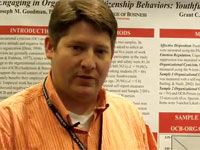
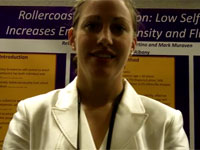

Comments
I am so proud to see my daughter, Chrysalis Wright, PHD, pictured in your publication.
I am so happy for her accomplishments in life that words just cannot express them.
She is my only child (I have 2 step-sons) and she is proof that a parent can go to college full time and raise a family (she has 5 beautiful children) and thanks to her husband for his support and for being a stay at home dad to take care of my grandchildren.
APS regularly opens certain online articles for discussion on our website. Effective February 2021, you must be a logged-in APS member to post comments. By posting a comment, you agree to our Community Guidelines and the display of your profile information, including your name and affiliation. Any opinions, findings, conclusions, or recommendations present in article comments are those of the writers and do not necessarily reflect the views of APS or the article’s author. For more information, please see our Community Guidelines.
Please login with your APS account to comment.